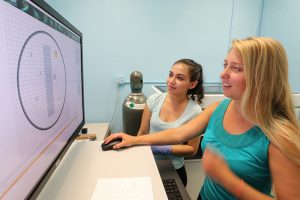Mentor: Kayla Kurtz, University of Rhode Island
Co-Mentor: Vinka Craver, University of Rhode Island
Project Location
University of Rhode Island-Bay Campus
Project Description

This is a collaborative project with environmental engineers and marine biologists. It investigates biofouling in marine environments and includes both coastal (field) sampling work and laboratory experiments with marine algae. Since biofouling can impact the ability of sensors to collect data within a few days of sensor deployment, it is important to identifying and testing different materials for resistance to biofouling by marine algae and organisms. Currently, reproductive propagules of the marine green macroalga Ulva are commonly used as model organisms for biofouling screening tests. Students participating in this project will determine variations in settlement and adhesive properties of Ulva spores in relation to species identity. Students will collect reproductive wild adult specimens during the summer at several Narragansett Bay locations representing different environmental characteristics.
For each specimen, species identity will be confirmed in the laboratory using morphological characteristics and genetic analysis, and the compositional characteristics of released reproductive propagules will be assessed. The adhesive properties of the propagules will be tested by allowing them to settle and attach to glass sides, and then blasting the slides with a controlled water jet stream to simulate the dynamic conditions of marine environments. This project aligns with RI C-AIM Thrust 3.
Additional Information
- “Film Study: Faculty and students from Bryant, Salve Regina and URI are finding ways to halt microbial communities interfering with marine sensors,” from RI C-AIM’s annual magazine The Current.

 RI NSF EPSCoR is supported in part by the U.S. National Science Foundation under EPSCoR Cooperative Agreements #OIA-2433276 and in part by the RI Commerce Corporation via the Science and Technology Advisory Committee [STAC]. Any opinions, findings, conclusions, or recommendations expressed in this material are those of the author(s) and do not necessarily reflect the views of the U.S. National Science Foundation, the RI Commerce Corporation, STAC, our partners or our collaborators.
RI NSF EPSCoR is supported in part by the U.S. National Science Foundation under EPSCoR Cooperative Agreements #OIA-2433276 and in part by the RI Commerce Corporation via the Science and Technology Advisory Committee [STAC]. Any opinions, findings, conclusions, or recommendations expressed in this material are those of the author(s) and do not necessarily reflect the views of the U.S. National Science Foundation, the RI Commerce Corporation, STAC, our partners or our collaborators.